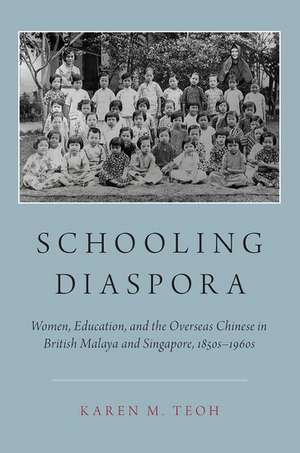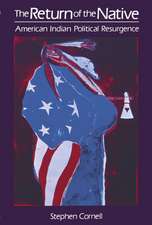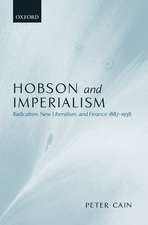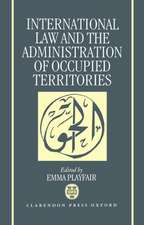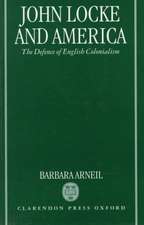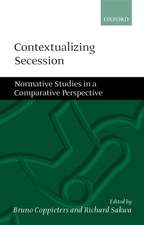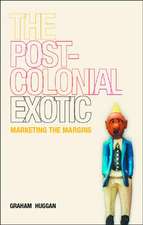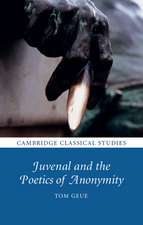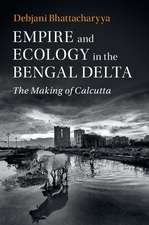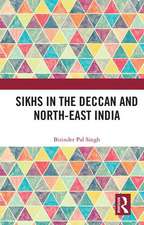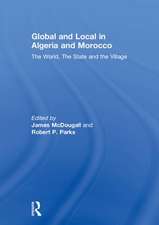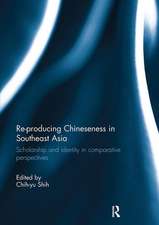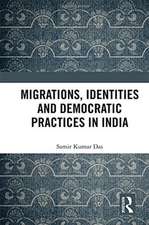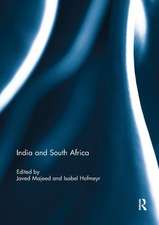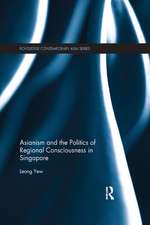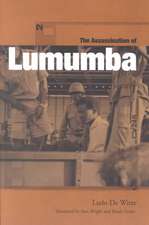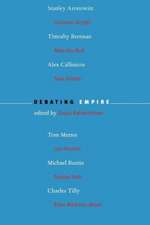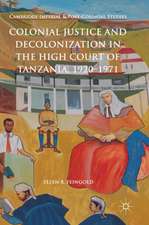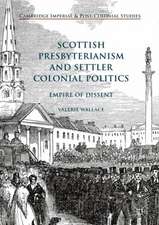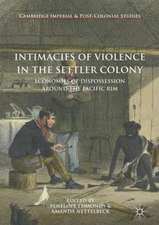Schooling Diaspora: Women, Education, and the Overseas Chinese in British Malaya and Singapore, 1850s-1960s
Autor Karen M. Teohen Limba Engleză Paperback – 17 iul 2020
| Toate formatele și edițiile | Preț | Express |
|---|---|---|
| Paperback (1) | 182.75 lei 11-16 zile | |
| Oxford University Press – 17 iul 2020 | 182.75 lei 11-16 zile | |
| Hardback (1) | 535.35 lei 32-37 zile | |
| Oxford University Press – feb 2018 | 535.35 lei 32-37 zile |
Preț: 182.75 lei
Preț vechi: 208.16 lei
-12% Nou
Puncte Express: 274
Preț estimativ în valută:
34.97€ • 38.14$ • 29.49£
34.97€ • 38.14$ • 29.49£
Carte disponibilă
Livrare economică 24-29 martie
Preluare comenzi: 021 569.72.76
Specificații
ISBN-13: 9780197533345
ISBN-10: 0197533345
Pagini: 248
Ilustrații: 23 hts
Dimensiuni: 231 x 155 x 15 mm
Greutate: 0.39 kg
Editura: Oxford University Press
Colecția OUP USA
Locul publicării:New York, United States
ISBN-10: 0197533345
Pagini: 248
Ilustrații: 23 hts
Dimensiuni: 231 x 155 x 15 mm
Greutate: 0.39 kg
Editura: Oxford University Press
Colecția OUP USA
Locul publicării:New York, United States
Recenzii
Karen M. Teoh helps readers both visualise and envision, through descriptive and detailed research, the lives, culture, and lived experiences of overseas Chinese women in female schools in British Malaya and Singapore from 1850s to 1960s. The work is a collection of oral histories, shared experiences, and research that presents a remarkable tribute to the collective body of overseas Chinese females whose experiences are represented therein ... [it] ensures that the complicated and winding history of overseas educated Chinese in British Malaya and Singapore is neither overlooked nor forgotten. The work also ensures imagined notions of overseas Chinese and female education in historical British Malaya and Singapore are viewed through their authentic, deeply dynamic realities.
Schooling Diaspora is a valuable contribution to our understanding of education as part of the colonial project and competing notions of gender in the Chinese community in Southeast Asia.
This book is an important contribution not only to the history of female education in Malaya, it also contributes significantly to our understanding of the experiences of Chinese migrants and the political participation of overseas-Chinese women in Malaya. It demonstrates how the intersections of national, ethnic and gender identities were played out for overseas-Chinese women as well as the convergences and divergences in the educational experiences of Chinese women across English-medium and Chinese-medium schools.
Schooling Diaspora... breaks new important ground in the historical study of the overseas Chinese. Not only does this book depart from the conventional focus on male mobility, but it also rejects tired assumptions of in-betweenness or a divided sense of belonging about a diasporic group. Rather, Teoh carefully delineates how different ideologies of colonialism, ethnonationalism, and patriarchy simultaneously lay claim to her subjects' commitments, complicating their identities... By moving beyond the national framework in considering questions of ethnicity and power, Teoh successfully recasts these familiar questions in a wider terrain where identity options were multiple and constantly shifting... The result of Teoh's efforts is a groundbreaking work that deftly brings together a variety of sources and interpretations about the transnational lives of educated Chinese women.
Schooling Diaspora successfully depicts how diasporic women's education has been woven into the transnational narratives of modernity and nationalism, and how education and women's self-identity mutually shaped each other. Bridging the gap between Chinese and Southeast Asian history, it provides an important transnational case study of diasporic Chinese women and their educational experience for the global discussion of education, gender and nationalism, and identity.
Schooling Diaspora tells the fascinating and little-known history of female education among the Overseas Chinese communities of southeast Asia. Using previously untapped sources in multiple languages and sensitive personal interviews, Teoh shows how the concerns of community leaders, colonial officials, and missionaries, and young women and their families combined to shape the educational experience of Chinese women. She shows beautifully how the question of what role women should play in the transition to a modern nation took distinctive forms in the colonial and multi-ethnic settings of southeast Asia.
To this history of women's education in Southeast Asia Teoh adds an insider's view from her own schooling in two of the institutions. Although Western missionaries and colonial officials frequently championed education for females and wrote about their achievements, she finds that local Chinese also sponsored schools for young women and may have had a more significant modernizing influence.
Teoh's research presents the intersection among gender, class, and inter-ethnic relationship in the contested terrain of overseas Chinese education in British Malaya. This book contributes greatly to understandings of the multifarious faces of overseas Chinese women and their unique trajectory of modernization. A must-read book for scholars interested in transnationalism and overseas Chinese.
This study skillfully integrates perspectives from history, political economy, and ethnography to unravel the complex interweaving of the education of Overseas Chinese females in colonial Malaya and Singapore with British colonialism, Chinese ethno-nationalism, patriarchy, and hybrid cultural identities. The archive-based narrative is enlivened by original interviews with Southeast Asia-born women who were schooled in the 1930s and 1940s, including some who were motivated by their education to re-migrate to China following the Communist revolution. Particularly striking are the different gendered worldviews embodied in English- and Chinese-language girls' schools, reflecting the different transnational as well as local political influences to which they were subject, within the same spaces.
Schooling Diaspora is a valuable contribution to our understanding of education as part of the colonial project and competing notions of gender in the Chinese community in Southeast Asia.
This book is an important contribution not only to the history of female education in Malaya, it also contributes significantly to our understanding of the experiences of Chinese migrants and the political participation of overseas-Chinese women in Malaya. It demonstrates how the intersections of national, ethnic and gender identities were played out for overseas-Chinese women as well as the convergences and divergences in the educational experiences of Chinese women across English-medium and Chinese-medium schools.
Schooling Diaspora... breaks new important ground in the historical study of the overseas Chinese. Not only does this book depart from the conventional focus on male mobility, but it also rejects tired assumptions of in-betweenness or a divided sense of belonging about a diasporic group. Rather, Teoh carefully delineates how different ideologies of colonialism, ethnonationalism, and patriarchy simultaneously lay claim to her subjects' commitments, complicating their identities... By moving beyond the national framework in considering questions of ethnicity and power, Teoh successfully recasts these familiar questions in a wider terrain where identity options were multiple and constantly shifting... The result of Teoh's efforts is a groundbreaking work that deftly brings together a variety of sources and interpretations about the transnational lives of educated Chinese women.
Schooling Diaspora successfully depicts how diasporic women's education has been woven into the transnational narratives of modernity and nationalism, and how education and women's self-identity mutually shaped each other. Bridging the gap between Chinese and Southeast Asian history, it provides an important transnational case study of diasporic Chinese women and their educational experience for the global discussion of education, gender and nationalism, and identity.
Schooling Diaspora tells the fascinating and little-known history of female education among the Overseas Chinese communities of southeast Asia. Using previously untapped sources in multiple languages and sensitive personal interviews, Teoh shows how the concerns of community leaders, colonial officials, and missionaries, and young women and their families combined to shape the educational experience of Chinese women. She shows beautifully how the question of what role women should play in the transition to a modern nation took distinctive forms in the colonial and multi-ethnic settings of southeast Asia.
To this history of women's education in Southeast Asia Teoh adds an insider's view from her own schooling in two of the institutions. Although Western missionaries and colonial officials frequently championed education for females and wrote about their achievements, she finds that local Chinese also sponsored schools for young women and may have had a more significant modernizing influence.
Teoh's research presents the intersection among gender, class, and inter-ethnic relationship in the contested terrain of overseas Chinese education in British Malaya. This book contributes greatly to understandings of the multifarious faces of overseas Chinese women and their unique trajectory of modernization. A must-read book for scholars interested in transnationalism and overseas Chinese.
This study skillfully integrates perspectives from history, political economy, and ethnography to unravel the complex interweaving of the education of Overseas Chinese females in colonial Malaya and Singapore with British colonialism, Chinese ethno-nationalism, patriarchy, and hybrid cultural identities. The archive-based narrative is enlivened by original interviews with Southeast Asia-born women who were schooled in the 1930s and 1940s, including some who were motivated by their education to re-migrate to China following the Communist revolution. Particularly striking are the different gendered worldviews embodied in English- and Chinese-language girls' schools, reflecting the different transnational as well as local political influences to which they were subject, within the same spaces.
Notă biografică
Karen M. Teoh is Associate Professor of History and Director of Asian Studies at Stonehill College.
